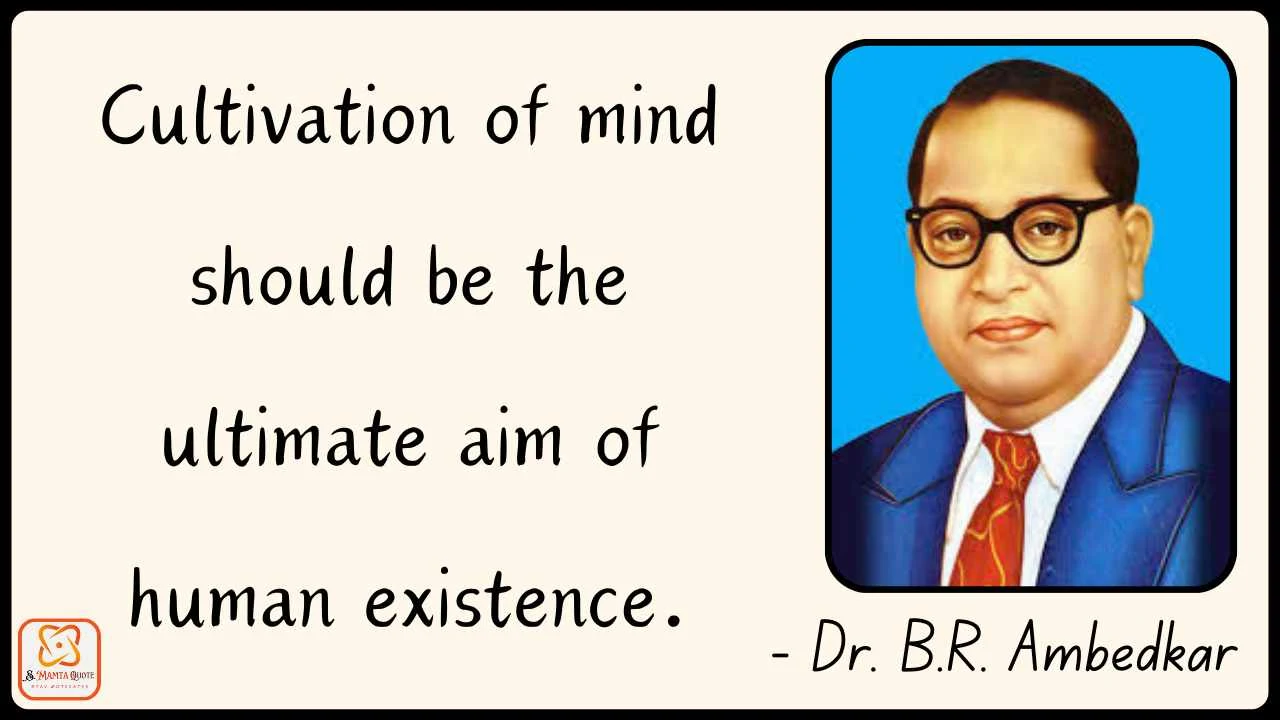Top 20 Quotes From Dr. B.R. Ambedkar
Let's Get Start.
01

Explanation:
Dr. Ambedkar was critical of religious systems that perpetuated inequality and discrimination. He believed in a religion that promoted fundamental human values such as liberty, equality, and fraternity, emphasizing the importance of social justice and harmony.
02

Explanation:
Dr. Ambedkar emphasized the importance of education and intellectual development in shaping individuals and societies. He believed that the pursuit of knowledge and enlightenment was crucial for human progress and liberation from social constraints.
03

Explanation:
Dr. Ambedkar valued the quality of life over its duration. He advocated for a life filled with purpose, dignity, and meaningful contributions to society, rather than mere existence.
04

Explanation:
Dr. Ambedkar recognized the intrinsic link between political democracy and social equality. He argued that without addressing social disparities and ensuring social justice, political democracy would be unsustainable.
05

Explanation:
Dr. Ambedkar underscored the importance of disseminating ideas and knowledge for their survival and impact. He believed in the power of ideas to drive social change but emphasized the need for active propagation and engagement to sustain them.
06

Explanation:
Dr. Ambedkar recognized the status of women as a barometer of societal progress. He advocated for gender equality and empowerment, understanding that the advancement of women is essential for the overall development of society.
07

Explanation:
Dr. Ambedkar highlighted the significance of social liberty alongside legal freedom. He argued that true freedom could only be realized when individuals were liberated from social prejudices, discrimination, and inequalities.
08

Explanation:
Dr. Ambedkar analyzed the complex interplay between ethics and economics in shaping human behavior and societal structures. He recognized the dominance of economic interests but also emphasized the role of ethical principles and collective action in challenging unjust economic systems.
09

Explanation:
Dr. Ambedkar underscored the importance of maintaining law and order in society to ensure its well-being and stability. He likened the administration of justice to the treatment of an ailing body, highlighting its crucial role in addressing societal ailments.
10

Explanation:
Dr. Ambedkar espoused the ideals of self-determination and personal agency. Despite facing immense adversity and discrimination, he believed in the power of individual efforts and resilience to shape one's destiny.
11

Explanation:
Dr. Ambedkar offered a critical perspective on religion, emphasizing its essence as a system of principles guiding moral conduct rather than a set of rigid rules. He cautioned against the dogmatic interpretation of religious doctrines, which could stifle individual conscience and ethical responsibility.
12

Explanation:
Dr. Ambedkar advocated for a partnership based on mutual respect, understanding, and companionship within marital relationships. He emphasized the importance of fostering a bond akin to friendship to ensure harmony and equality between spouses.
13

Explanation:
Dr. Ambedkar viewed religion as a means to facilitate spiritual growth and inner transformation. He believed that the essence of religion lay in nurturing the inner self and fostering virtues such as compassion, humility, and self-awareness.
14

Explanation:
Dr. Ambedkar acknowledged the role of fear as a coercive force in upholding legal frameworks and maintaining social order. However, he also recognized the limitations of fear-based enforcement in fostering genuine adherence to the principles of justice and equity.
15

Explanation:
Dr. Ambedkar celebrated the individuality and inherent dignity of every human being. He rejected the notion of complete assimilation into society, asserting the importance of personal growth and self-realization alongside societal development.
16

Explanation:
Dr. Ambedkar emphasized the primacy of national identity over any other affiliations or divisions. He called for unity among Indians, transcending caste, creed, or regional differences, to foster a strong and cohesive nation.
17

Explanation:
Dr. Ambedkar recognized the need to transcend religious dogma and orthodoxy to foster national unity and progress. He advocated for critical engagement with religious texts, emphasizing the importance of rational inquiry and social cohesion over blind adherence to scriptures.
18

Explanation:
Dr. Ambedkar conceptualized democracy not just as a political system but as a way of life characterized by collective participation and shared experiences. He underscored the importance of inclusive governance and societal engagement in fostering a vibrant democratic ethos.
19

Explanation:
Dr. Ambedkar emphasized the significance of mental liberation in the pursuit of true freedom. He recognized that oppressive ideologies and social norms could enslave individuals even in the absence of physical bondage, underscoring the importance of critical thinking and intellectual autonomy.
20

Explanation:
Dr. Ambedkar offered a profound critique of the caste system, highlighting its exploitative nature and the perpetuation of social inequality. He rejected the notion of caste as a benign classification of occupations, exposing its underlying structure of oppression and discrimination.
Conclusion

.png)

.png)





.webp)






.webp)
.webp)